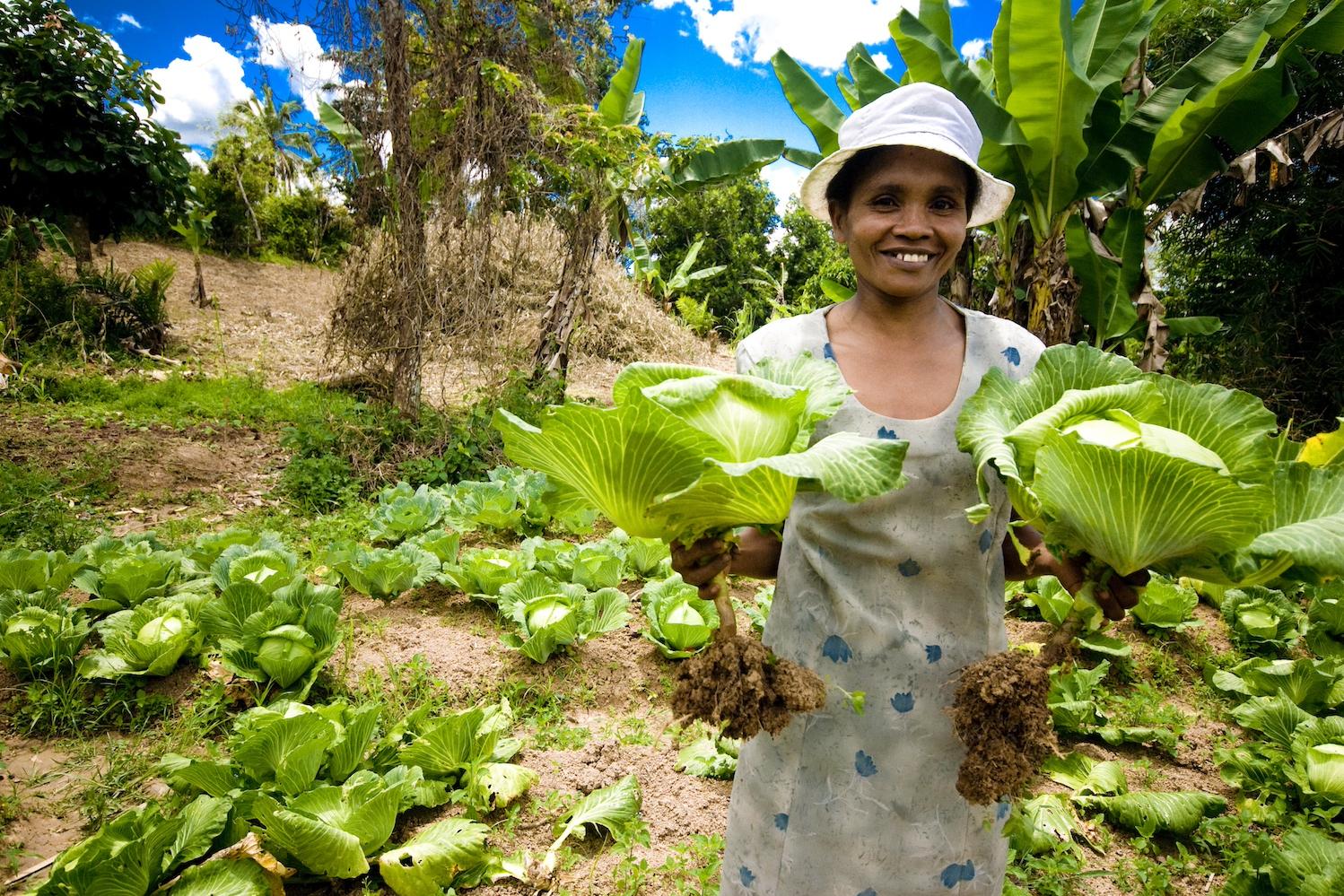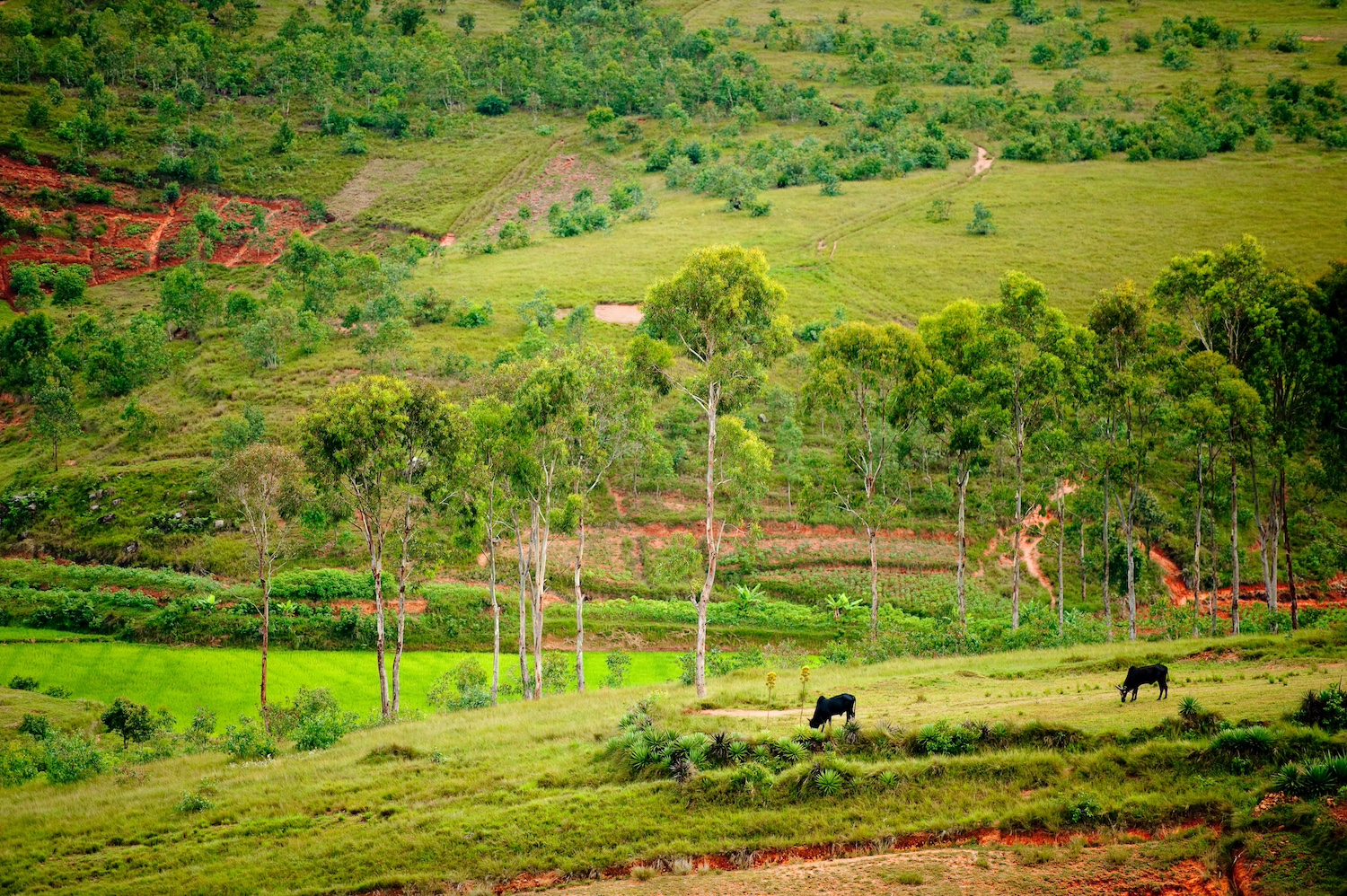
Chinese cabbage is planted by members of a local farmers' organization in Vavatenina district, Madagascar, as a part of an International Fund for Agricultural Development program in 2009. (Image: R. Ramasomanana/International Fund for Agricultural Development)
A six-year, $150 million program is helping smallholder farms in Madagascar build drought resilience. By directly supporting about 500,000 farmers struggling to raise crops in the drought-stricken country, the program is expected to benefit 3.5 million people through food access and other ripple effects.
Water scarcity is a persistent problem in Madagascar, which experienced five severe droughts in the past two decades. Arid conditions are nothing new to the southern part of the country, but they are becoming drastically worse with climate change. When the country isn’t in drought, it’s instead pummeled by cyclones and floods that make it nearly impossible to reach rural areas.
The severe weather patterns repeatedly destroy crops, infrastructure and livelihoods. As the country’s economy remains dependent on low-productivity, rain-fed agriculture, the ongoing underperformance of the sector is seen as one of the main causes of food insecurity and poverty. More than 1.3 million people in Madagascar have faced severe hunger and starvation since the current drought began in 2021, according to the humanitarian organization World Food Program.
The Inclusive Agricultural Value Chains Program (DEFIS+) will build on an existing program run by the International Fund for Agricultural Development, a United Nations agency focused on supporting small-scale rural producers, that’s already seen success in boosting climate resilience and food security for smallholder farmers in Madagascar. So far, the program has spread resilient practices to 10,000 hectares of farmland and increased yields by as much as 30 percent, said Joseph Rostand Olinga Biwole, one of the fund’s country directors in Africa. The expansion is a partnership between the UN agency and Green Climate Fund, which supports climate action in developing countries.
As water-intensive rice is one of the most popular crops in the region — alongside others like legumes, vegetables and livestock — water management is a critical part of the resilient growing practices taught in the programs.
“The major one here is water management,” Biwole told TriplePundit. “The main issue is around water distribution within the plots. You have to make sure water is reaching all the plots within the area.”
The other pieces of the program, like early weather warning systems, build on the water management emphasis. Providing farmers with the latest weather updates lets them know when to plant and whether there will be enough water available to sustain the crops they’re considering planting through the growing season, Biwole said.
The new program “will really bring up to scale what [the fund] already tested here in Madagascar, what is already known as being efficient,” Biwole said. “For example, in terms of early warning, we will establish and provide all the equipment for at least six agro-meteorological stations that will be placed within the area of intervention in the south of Madagascar to provide sound meteorological information to the beneficiaries.”
With this information, farmers can plan their planting and farming practices around the climate, he said. The program intends to bring resilient farming practices to 15,000 more hectares and train 1,400 water user association members and 900 technicians who can advise farmers on water use.
“We also intend to have sound farming practices whereby they use organic fertilizers, and these will also allow them to use some solutions that they can have locally, such as using manure,” Biwole said. “From the combination of livestock production and crop production, they will be really well prepared to face or to tackle changes of our climate in their fields.”
Improving seed stock is another important part of making Madagascar’s farmland resilient and is the other key focus of the fund’s programs. Since seeds are gathered from each harvest to be used in the next planting season, if farmers can only access low-quality seeds, it negatively impacts their subsequent yields, Biwole said. The newly expanded program distributes seeds adapted to the local conditions, which will increase yield for participating farmers. It also includes seed research and technical support from the Madagascar Ministry of Agriculture, Livestock and Fisheries.
“We support seed producers,” Biwole said. “Our projects have produced more than 900 metric tons of seeds here in Madagascar.”

In addition to increased yields, the fund’s existing Madagascar program has already helped roughly 70 to 75 percent of participating farmers get out of poverty, Biwole said. He credited the increased incomes to the program’s work connecting farmers with market access by facilitating contracts for the farmers to sell their produce more widely.
Reaching farms in remote, rural areas of Madagascar is one of the biggest challenges in providing support to farmers, and that hurdle persists. The roads in the countryside can make farms inaccessible, which can also result in food spoiling before it can get to market, Biwole said. Sometimes, farmers aren’t even aware that seeds are available because there is no way to get the news to them.
“Rehabilitation of roads is already part of efforts to reduce post-harvest losses … to make sure their food will actually move from the place or the area of production to the market,” Biwole said. But that will be a recurring issue with the annual cyclone season.
While the situation in Madagascar may appear to be improving from a macro level, Biwole said he’s still concerned about the 800,000 youth joining the job market each year. He’s hopeful solutions can be found through the strengthening agriculture industry.
“This is really, really important, because we should make sure these young people have access to a minimum of means to sustain their participation within the society,” he said.

Riya Anne Polcastro is an author, photographer and adventurer based out of Baja California Sur, México. She enjoys writing just about anything, from gritty fiction to business and environmental issues. She is especially interested in how sustainability can be harnessed to encourage economic and environmental equity between the Global South and North. One day she hopes to travel the world with nothing but a backpack and her trusty laptop.














